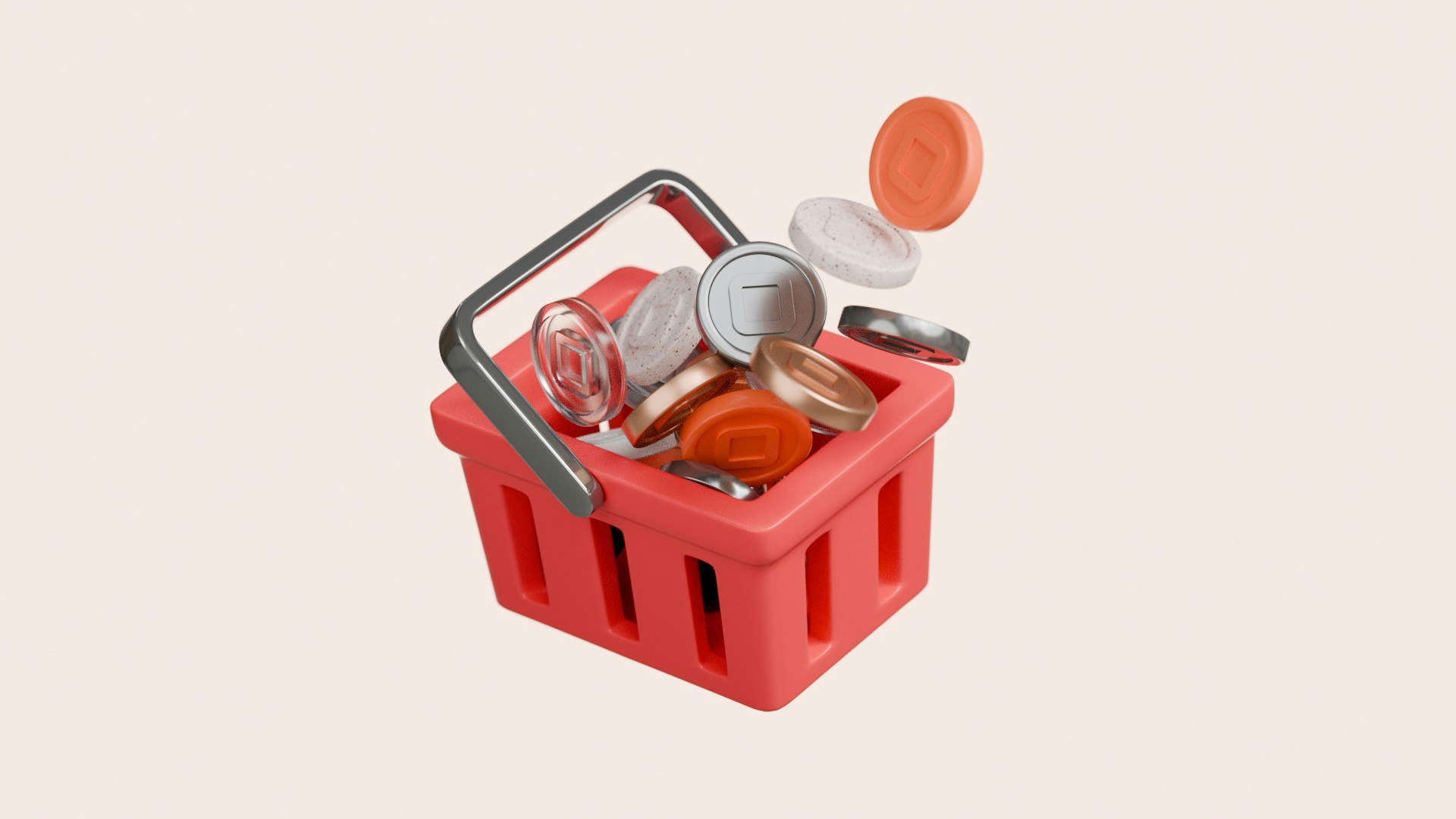Don’t invest unless you’re prepared to lose all the money you invest. This is a high‑risk investment and you should not expect to be protected if something goes wrong.
How to Buy Crypto: A Beginner’s Guide
How to buy crypto: Here is a guide to show you how convenient it is to buy cryptocurrency using CoinJar.
In this article...
- Take your first steps into the world of cryptocurrency.
- Learn the basics of buying crypto in this comprehensive guide.
- Navigate the crypto market confidently with this beginner's roadmap.

How to buy crypto: So, you’ve decided to dive face-first into the exciting world of ! Go you! Whether you’re looking to invest, trade, or simply explore this digital frontier, understanding how to buy crypto is essential.
In this guide, we’ll walk you through the process step by step, ensuring you’re well-equipped to embark on your crypto journey.
Choose a reliable cryptocurrency exchange
The first step in buying crypto is selecting a trustworthy exchange or trading platform. Here are some key factors to consider:
Company authenticity and platform protection
Research the exchange’s reputation, protection protocols, and history of handling user funds. CoinJar has great reviews from independent platforms like .
Ease of Use
Opt for an exchange with a user-friendly interface that suits your level of experience.
Fees and Charges
Compare fees, spreads, and any hidden costs associated with transactions.
Customer Support
Look for exchanges that offer responsive customer service.
Number of Supported Coins
Consider the variety of cryptocurrencies available on the platform. offers a seamless experience for buying, selling, and storing crypto. And it has over 50 cryptocurrencies to choose from.
Create an account and verify your identity
Once you’ve chosen an exchange, sign up for an account. You’ll need to provide personal information and undergo a verification process.
This typically involves verifying your identity and linking your bank account. UK residents are required (in accordance with local legislation) to complete an assessment and to wait 24-hours (see note at the end of the article).
Fund your account
To buy crypto, you’ll need to deposit funds into your exchange account. You can use various payment methods.
Bank transfer
Transfer fiat currency (such as GBP Sterling) from your bank account to the exchange.
Debit or credit card
Some exchanges allow direct purchases using cards. CoinJar has an facility where you can purchase crypto instantly with a card. There are also other methods available on CoinJar so choose the method that suits you best.
Purchase with crypto
Once you buy some crypto, you can then buy other cryptocurrencies using the original crypto you bought with everyday money. Note that exchanging one cryptocurrency for another can incur fees, and may have tax implications.
Choose a cryptocurrency
Now comes the exciting part: Choosing which cryptocurrency to buy. Consider factors like your investment goals, risk tolerance, and market research.
Popular options include Bitcoin (BTC), Ethereum (ETH), and XRP (XRP).
Execute your purchase
Once you’ve selected a coin, place your order. You can choose between market orders (executed at the current market price) or limit orders (set a specific price at which you want to buy).

Protect your investment
After purchasing crypto, you can keep it on the exchange. Or you can transfer it to an external digital wallet. If you keep it on the exchange, it makes the crypto readily accessible if you want to exchange it for other crypto or sell it.
But, if the crypto exchange goes bankrupt () or if the exchange gets hacked, your crypto could be at risk. If you buy crypto on the CoinJar app, then the crypto you purchase will simply go into your wallet on the app, you don't need to set a separate wallet up. it is a user-friendly app for beginners.
After you build some confidence, you can create an external online wallet independent of CoinJar (hot wallet), or download your crypto to a cold wallet / hardware wallet (which means it's not connected to the internet so you reduce the risk of hacking).
Conclusion: How to buy crypto
With the right knowledge and a reliable exchange like CoinJar, you’re well on your way to becoming a crypto enthusiast.

Glossary of terms
Address: A unique alphanumeric identifier that represents a specific crypto wallet. It's used to send and receive cryptocurrencies, similar to a bank account number.
Altcoin: Any cryptocurrency other than Bitcoin. Examples include XRP, Ethereum and many others.
ATH (All-Time High): The highest price a cryptocurrency has ever reached.
ATL (All-Time Low): The lowest price a cryptocurrency has ever reached.
Bitcoin: The first and most well-known cryptocurrency, a digital currency operating on a decentralized network called a blockchain.
Bitcoin Cash: A cryptocurrency that emerged from a fork of Bitcoin. It aims to increase transaction capacity and efficiency.
Blockchain: A decentralized, digital ledger that records cryptocurrency transactions across a network of computers. This technology ensures transparency and security.
Block: A group of transactions bundled together and added to the blockchain.
Cold Storage: Storing cryptocurrencies offline, typically using a hardware wallet, to enhance security against hacking.
Crypto Wallet: A digital tool used to store, manage, and access your cryptocurrencies. Think of it like a digital bank account for your digital assets. CoinJar provides a crypto wallet for its users.
Cryptocurrencies: Digital currencies that use cryptography for security and operate independently of central banks. Examples include Bitcoin, Ethereum, Litecoin, and many others.
Debit Card: A payment card linked to your bank account that allows you to make purchases and withdraw cash. You can use your debit card to purchase cryptocurrencies on CoinJar, noting using a debit card results in additional fees.
Decentralized: A key characteristic of cryptocurrencies, meaning they are not controlled by any single entity like a government or bank.
DeFi (Decentralized Finance): A movement that aims to create a financial system that is open, transparent, and accessible to everyone, using blockchain technology.
Digital Assets: A broad term encompassing cryptocurrencies and other digital representations of value or ownership rights.
ERC-20: A technical standard for creating and issuing tokens on the Ethereum blockchain.
Exchange: A platform where you can buy, sell, and trade cryptocurrencies. CoinJar acts as an exchange.
Fiat Currency: Traditional government-issued currency, such as Australian Dollars, US Dollars, Euros, etc.
Fork: A split in a blockchain that creates a new version of the cryptocurrency with potentially different rules.
Gas: A fee paid in Ethereum to execute transactions and smart contracts on the network.
Hold Cryptocurrencies: To keep cryptocurrencies in your crypto wallet for long-term investment or future use.
Hot Storage: Storing cryptocurrencies online, typically in an exchange wallet or software wallet.
KYC (Know Your Customer): Verification procedures used by exchanges to comply with regulations and prevent fraud. UK residents are required (in accordance with local legislation) to complete an assessment and to wait 24-hours (see note at the end of the article).
Market Capitalization: The total value of a cryptocurrency, calculated by multiplying the current price by the total number of coins in circulation.
Mining: The process of verifying and adding new transactions to the blockchain, often requiring significant computing power.
Node: A computer connected to the blockchain network that helps validate and relay transactions.
Private Keys: Secret cryptographic codes that grant you ownership and control over your cryptocurrencies within a wallet. It's crucial to keep your private keys secure.
Purchase Bitcoin: The act of buying Bitcoin using traditional currency, such as Dollars, or other cryptocurrencies.
Purchase Cryptocurrencies: The act of buying any type of cryptocurrency, including Bitcoin, Ethereum, XRP, and others. CoinJar facilitates the purchase of various cryptocurrencies.
Smart Contract: A self-executing contract with the terms of the agreement directly written into code.
Stablecoin: A type of cryptocurrency designed to maintain a stable value by pegging it to another asset, such as the US dollar.
Staking: The process of holding cryptocurrencies in a wallet to support the operation of a blockchain network and earn rewards.
Token: A digital asset that represents a specific unit of value or utility within a blockchain ecosystem.
Transaction Fee: A small fee paid to miners for processing and confirming transactions on the blockchain.
Volatility: The degree of price fluctuation in a cryptocurrency. Cryptocurrencies can be highly volatile, meaning their prices can change significantly in a short period.
Whitepaper: A document that outlines the technical details, goals, and vision of a cryptocurrency project.
Frequently asked Questions
What are crypto exchanges?
Crypto exchanges are online platforms where you can buy, sell, and trade various cryptocurrencies. They facilitate transactions between buyers and sellers, providing liquidity to the crypto market.
How do I trade crypto?
To trade crypto, follow these steps:
Choose a reliable exchange.
Create an account and verify your identity.
Deposit funds.
Select a cryptocurrency.
Execute your trade by placing a buy or sell order.
How can I buy cryptocurrency?
Buying cryptocurrency involves:
Selecting an exchange.
Creating an account.
Depositing funds.
Choosing a coin to purchase.
Where can investors buy Bitcoin?
You can buy Bitcoin on most major exchanges, including CoinJar. Follow the steps mentioned earlier to get started.
What is the minimum amount of cryptocurrency I can buy?
The minimum amount varies by exchange. On CoinJar you only need £20 to start buying.
How do I sell cryptocurrency?
To sell crypto:
Log in to your exchange account.
Choose the coin you want to sell.
Place a sell order at the desired price.
Which cryptocurrency should investors purchase?
Consider your investment goals, risk tolerance, and market research. Popular options include Bitcoin, Ethereum, and XRP.
What factors affect the amount of cryptocurrency I can buy?
Several factors influence the amount:
Budget: The more funds you have, the more crypto you can purchase.
Coin Price: If a coin’s price is high, you’ll get fewer units for the same amount.
Exchange Fees: Consider transaction fees when calculating your purchase.
What is crypto trading?
Crypto trading is the buying and selling of cryptocurrencies through an exchange or trading platform. Similar to traditional stock trading, crypto traders aim to profit from price fluctuations in the market by buying low and selling high.
Trading typically involves using technical analysis tools and market research to identify potential opportunities and make informed decisions.
What are altcoins, and how do they differ from Bitcoin?
Altcoins (alternative coins) refer to all cryptocurrencies other than Bitcoin. They vary in technology, use cases, and features.
While Bitcoin is the pioneer and primarily a store of value, altcoins serve diverse purposes (e.g., Ethereum for smart contracts, XRP for cross-border payments).
What protection measures matter?
Check if the exchange uses secure cold wallets, has a responsive support team, and follows best practices.
Is crypto investing risky?
Crypto investing can be volatile. Be aware of price fluctuations and invest only what you can afford to lose.

Suggested Articles
What is Bitcoin (BTC)? What is "Digital Gold" Used For?
What is Bitcoin? It is a digital currency that can be traded, exchanged, and used as a form of payment independent of central banks and governments.What is Ethereum? What is ETH Used For?
Ethereum is a decentralised blockchain-based open-source software platform that allows for the development of decentralised applications (dApps).What Is Crypto? How do Cryptocurrencies Work?
Crypto has become incredibly popular. But how does this digital currency work? And are there cryptos other than Bitcoin?Browse by topic



Cryptoassets traded on CoinJar UK Limited are largely unregulated in the UK, and you are unable to access the Financial Service Compensation Scheme or the Financial Ombudsman Service.
We use third party banking, safekeeping and payment providers, and the failure of any of these providers could also lead to a loss of your assets. We recommend you obtain financial advice before making a decision to use your credit card to purchase cryptoassets or to invest in cryptoassets. Capital Gains Tax may be payable on profits.
CoinJar’s digital currency exchange services are operated in the UK by CoinJar UK Limited (company number 8905988), registered by the Financial Conduct Authority as a Cryptoasset Exchange Provider and Custodian Wallet Provider in the United Kingdom under the Money Laundering, Terrorist Financing and Transfer of Funds (Information on the Payer) Regulations 2017, as amended (Firm Reference No. 928767).
Apple Pay and Apple Watch are trademarks of Apple Inc. Google Pay is a trademark of Google LLC.
This site is protected by reCAPTCHA and the and apply.